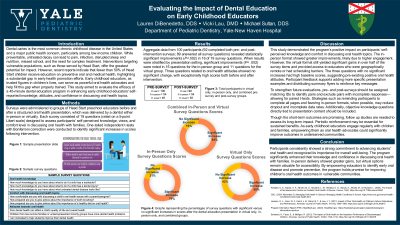Preventive
50 - Evaluating the Impact of Dental Education on Early Childhood Educators

.jpg)
Vicki Lau, DMD
Pediatric Dental Resident
Yale-New Haven Hospital- LD
Lauren DiBenedetto, DDS, FAAPD, MPH
Associate program director
Yale-New Haven, New Haven, CT
New Haven, Connecticut, United States - LD
Lauren DiBenedetto, DDS, FAAPD, MPH
Associate program director
Yale-New Haven, New Haven, CT
New Haven, Connecticut, United States - MS
Michael Sultan, DDS
Program Director
Yale-New Haven, New Haven, CT
New Haven, Connecticut, United States
Presenting Author(s)
Co-Author(s)
Research Mentor(s)
Program Director(s)
Purpose: This study aimed to evaluate the efficacy of a 45-minute dental education program in enhancing early childhood educators' self-reported knowledge, attitudes, and confidence in discussing oral health topics.
Methods: Surveys were administered to groups of preschool educators before and after a structured oral health presentation, which was delivered by a dentist either in-person or virtually. Each survey consisted of 19 questions (rated on a 5-point Likert scale) designed to assess participants' self-perceived knowledge, views, and comfort level in discussing oral health with families. One-tailed independent t-tests with Bonferroni correction were conducted to identify significant increases in scores following intervention.
Results: Aggregate data from 100 participants (92 completed both pre- and post-intervention surveys; 89 answered all survey questions) revealed statistically significant improvements (P<.002) in 16 of 19 survey questions. When results were stratified by presentation setting, significant improvements (P < .002) were noted in 15 questions for the in-person group and 11 questions for the virtual group. Three questions related to oral health attitudes showed no significant change, with exceptionally high scores both before and after intervention.
Conclusion: Participants consistently showed a strong commitment to advancing students' oral health and recognized its importance for overall well-being.The program significantly enhanced their knowledge and confidence in discussing oral health with families. In-person sessions proved to be slightly more effective, though virtual options provide viable alternatives for remote access. By empowering educators to identify early oral disease and promote prevention, the program holds promise for improving children's oral health outcomes in vulnerable communities.
Identify Supporting Agency and Grant Number:

.jpg)